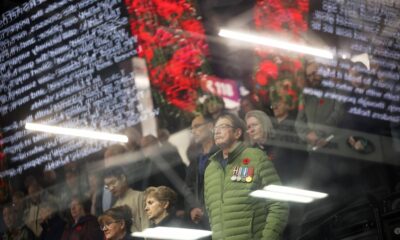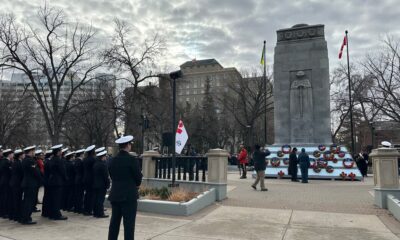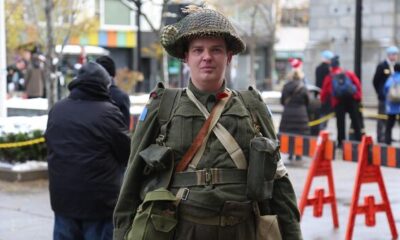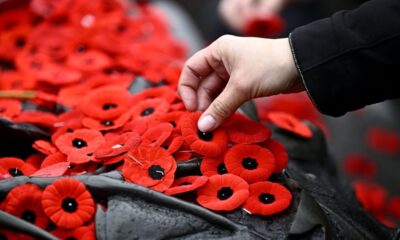Politics
Ford Calls for Action Beyond Symbolism on Remembrance Day
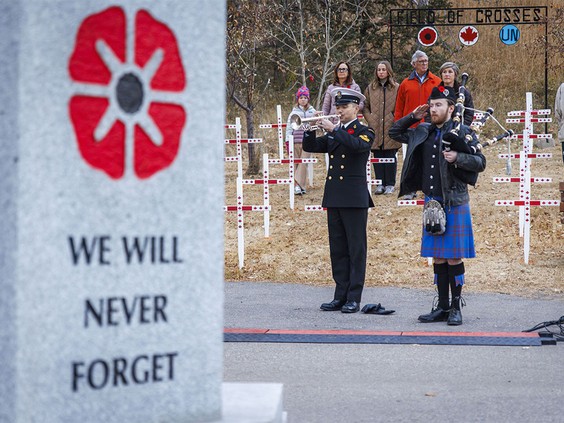
As Remembrance Day passes, discussions are emerging about the ongoing treatment of Canadian veterans. While the day was marked by solemn observances and the widespread wearing of red poppies, critics are now questioning whether such gestures are enough to honor those who have served. Ford, a prominent voice in this debate, emphasizes the need for action beyond mere symbolism.
Symbolism vs. Substance
On Remembrance Day, Canadians participated in traditional ceremonies. Children recited the poem In Flanders Fields, wreaths were laid at memorials, and moments of silence were observed. However, as the day fades into memory, the question arises: what happens next? Many of the poppies worn in remembrance will soon be discarded, their significance diminished as the occasion is forgotten. The issue at hand is whether the day’s ceremonies truly reflect a commitment to honoring veterans or if they merely serve to satisfy societal expectations.
The reality is sobering. In 2025, veterans in Canada still turn to food banks for assistance. This situation raises a critical question: why are veterans, who have sacrificed so much, facing food insecurity? Ford, who has personal connections to the military through family members who served, expresses deep concern about this ongoing issue. She highlights a contradiction where public expressions of remembrance coexist with the harsh reality that veterans must seek basic necessities.
Examining the Support Systems
Many Canadians are aware of the programs and benefits available through Veterans Affairs Canada (VAC). In theory, these services are designed to support veterans through various assistance initiatives. However, the existence of food banks for veterans suggests that these measures may not be sufficient. This disparity prompts a deeper investigation into how veterans are treated post-service.
Ford’s exploration into this topic reveals a complex landscape. Despite assurances from government sources that veterans are being adequately supported, the need for food banks raises alarms. The absence of specific mentions of veterans’ food banks in the Canadian budget adds to the confusion. While VAC touts its initiatives, the reality on the ground appears to tell a different story.
“Don’t talk in pious and sombre tones about ‘remembrance’ and ‘honour’ only to accept the fact that surviving veterans must ask to be fed.”
This statement encapsulates the frustration felt by many regarding the juxtaposition of remembrance and ongoing neglect. The emotional weight of such a statement reflects the discontent felt by those who believe the government must do more to support its veterans.
As discussions continue, it is clear that while symbolic gestures hold value, they must be accompanied by tangible support. The need for food banks for veterans is an indictment of the systems currently in place. Addressing this issue requires both public awareness and governmental accountability.
As Canada moves forward, the challenge remains: how can society ensure that the sacrifices of veterans are met with equal commitment in their care? The call to action is clear: it is time to transform remembrance into meaningful support that honors the true spirit of service.
-

 Politics6 days ago
Politics6 days agoSecwepemc First Nation Seeks Aboriginal Title Over Kamloops Area
-

 World4 months ago
World4 months agoScientists Unearth Ancient Antarctic Ice to Unlock Climate Secrets
-

 Entertainment4 months ago
Entertainment4 months agoTrump and McCormick to Announce $70 Billion Energy Investments
-

 Lifestyle4 months ago
Lifestyle4 months agoTransLink Launches Food Truck Program to Boost Revenue in Vancouver
-

 Science4 months ago
Science4 months agoFour Astronauts Return to Earth After International Space Station Mission
-

 Technology3 months ago
Technology3 months agoApple Notes Enhances Functionality with Markdown Support in macOS 26
-

 Top Stories1 month ago
Top Stories1 month agoUrgent Update: Fatal Crash on Highway 99 Claims Life of Pitt Meadows Man
-

 Sports4 months ago
Sports4 months agoSearch Underway for Missing Hunter Amid Hokkaido Bear Emergency
-

 Politics3 months ago
Politics3 months agoUkrainian Tennis Star Elina Svitolina Faces Death Threats Online
-

 Politics4 months ago
Politics4 months agoCarney Engages First Nations Leaders at Development Law Summit
-

 Technology4 months ago
Technology4 months agoFrosthaven Launches Early Access on July 31, 2025
-

 Top Stories3 weeks ago
Top Stories3 weeks agoFamily Remembers Beverley Rowbotham 25 Years After Murder





